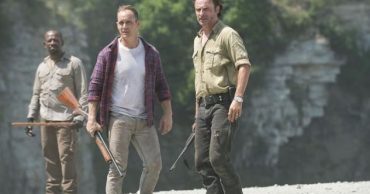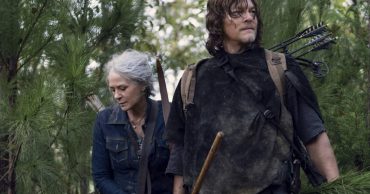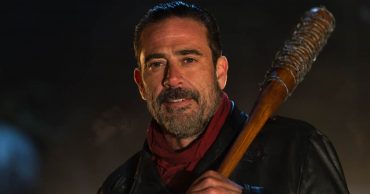
From the beginning, The Walking Dead‘s been a show about humanity. At the center of it, of course, is Rick Grimes’ often-silent existential battle with himself, a man of law slowly folding to the pressures of an anarchistic, sadistic world. Time and time again, The Walking Dead‘s punished Rick’s “good” heart, each act of violence another metaphysical nail in his coffin, whether with Shane, The Governor, or Joe, the cowboy with a code who puts a gun to Rick’s head in the opening scene of tonight’s “A”.
Each time the show revisits Rick’s crumbling humanity, it appears to be making the same point: Rick will do anything to protect his family, even if it means sacrificing his own soul in the process. Time and time again, the obstacles The Walking Dead throws at Rick are like the rabbit trap he so ominously describes to Carl and Michonne: they are narratives designed to tunnel their protagonist into a corner, forcing him to lash out violently against his will. To simply kill him and relieve him of the many miseries that haunt him (which, being the main character of the series, would be a hard thing to do) would be too simple: it’s simply more dramatic to dangle the carrot of hope in front of Rick and rip it away from him, something “A” does multiple times with glee.
Needless to say, The Walking Dead‘s relentless pursuit of stripping Rick’s humanity hasn’t exactly been approached with nuance: in “A”, he becomes “The Walking Dead”, ripping the artery from Joe’s neck with his teeth, a man whose only instinct is to kill, kill, kill – which he does once again at Terminus, after noticing Herschel’s watch (which had been given by him, to Glenn) in the hand of a Terminus ’employee’ (another was wearing Maggie’s wrap, for good measure) in his hand. It’s only a matter of seconds before Rick puts a bullet in the side of his head, leaving the group of four sprinting away from the worst group of snipers in television history (then again, this could be intentional: the vague hints that these people are eating newcomers suggests they might not want to shoot anyone, for the sake of ruining good meat).
In the process, they run by a few clues: a few signs that say “Never trust” in a room memorializing a bunch of people (can you say fire hazard?) and a pair of train cars filled with people screaming for help. Rick, Carl, Michonne, and Daryl end up in a third train car, which also houses the rest of the prison survivors (save for Carol, Tyreese, Judith, and Beth, who remains MIA), unarmed and really not in the mood for a family reunion. But the focus never leaves Rick Grimes, who stands in the darkness of the train car, embracing the homicidal side that Carl is just starting to notice in himself (“I’m just a monster, too” he tells Michonne as they explore the outskirts of Terminus), and ends with him making a declaration of war: “They’re screwing with the wrong people”, he announces, in a final bit of dialogue that really would’ve benefited from a good ol’ F-bomb (even muted as Breaking Bad employed it multiple times; it just makes that final line so much more effective – plus it would mirror a badass moment from the comics).
It ends a finale with a much smaller focus than “Us”, returning to the smaller scale of season 4.5 one last time, to tell us the same story we’ve seen with Rick Grimes numerous times before. But what makes this particular incarnation of this downward spiral work are the flashbacks embedded at climatic points of the episode: in them, Herschel shows Rick a more peaceful way of life, connecting the dots between the Rick we left in the season three finale, and the one we returned to with “30 Days Without An Accident”. Where Rick was once willing to embrace a more peaceful role in the world, the loss of his moral compass (either Lori or Herschel, you choose) has led him squarely to the dark side of the new-world order, unable to trust anyone or anything, including himself (unless it involves bringing a dose of the ultra-violence to keep his son alive, then he can muster up a little self-respect).
It’s a rare moment of reflection for Rick, sitting on the side of the road covered in a stranger’s blood. He remembers reluctantly letting his guard down, and feeling hope for once in his life. But there is no room for optimism on The Walking Dead, no karmic powers at work, except those that continuously punish characters until they’re emotionally hollow. And it’s that unwavering pessimism that ultimately holds “A” back from being a ‘great’ episode of the show: there’s no room for growth there, only for Rick to return to the dark recesses of his mind where his conscience once rest. Things do not get better: characters split up, come together, and split up again – and as long as the challenges Rick faces become more disturbed and morally bankrupt, there’s only one direction for the show to go.
Does it matter who Gareth is, or how the prison survivors will escape a jail they didn’t make for themselves (well… except Rick)? A few things are guaranteed: people will eventually die (I’m sure Rick’s revolver-containing backpack will be dug up in the near future), zombies will eventually show up, and Rick will take his place as commander of the group again out of rage. I suppose the interest is is the how – but personally, the more interesting questions come in the why, something The Walking Dead always struggles to answer beyond “do whatever it takes”. Rick understands he’s losing his son in this episode – and does nothing to foster any kind of different opinion, shanking a man and shooting another right in front of him without hesitation. Necessary actions? Sure (at least the first), but when the show isn’t giving him any sort of moral choice to make (at ANY point), are his ultimate actions all that shocking, or revealing? It makes the conclusion feel incomplete, not only ending on an anti-climatic note, but in a way that culminates a character arc we’ve seen numerous times over.
If anything, I’ve appreciated the storytelling devices The Walking Dead used in the back half of this season, weaving multiple narratives and time lines together, separating characters and narrowing the focus of each episode down to distill some of the show’s more interesting personalities. It hasn’t worked all the time, but at least tried to do something different with a number of very similar stories. It’s the difference between these eight episodes and the handful of episodes spent in the first few seasons not spent at the farm or the prison: when characters are on the move and separated, The Walking Dead‘s bare bones characterizations and philosophies can gain a little bit of depth. When it’s working towards a single character- goal (and one it’s reached, numerous times over) “A” isn’t all that satisfying a conclusion – but on the shoulders of the episodes that precede it, completes the show’s most enjoyable run of episodes in undeniably brutal, tense fashion.
Other thoughts/observations:
– For some odd reason, Daryl doesn’t offer Rick an explanation of what happens to Beth, replying “She’s just gone” to his repeated inquiries.
– Rick calls Daryl his “brother”, a nice little man love moment the show doesn’t try to play too heavy.
– best moment? As with many episodes in this second half, it comes with Michonne and Carl, as she tells him the story of her “losing herself” after leaving a refugee camp with two zombies in chains and a big-ass sword in her hand.
– pile of bones stripped of meat? We’ve got cannibals, folks.
– in the flashbacks, Patrick puts together a LEGO set while Carl cleans and reassembles a handgun. Not the most subtle imagery.
– hope you’ve enjoyed reading my reviews over here for the last 12 episodes. Thanks for reading – see you this fall for season five!
[Photo via Gene Page/AMC]
 Follow Us
Follow Us






I don’t believe Rick shot the man with the watch, if that’s to whom you were referring. When Gareth dropped his hand as a signal to the others to shoot Rick, he turned and placed the man in the line of fire and the man was shot instead. Of course Rick has already killed many in front of Carl at this point.. The snipers were trying to herd the group, as even they realized when they said they were shooting at their feet. The other captives were in shipping containers, not train cars. Shipping containers go on rail cars. Other sites have referred to the boxcar the group goes into as a container, but alas, it is not. Other than that, you raised some valid points.